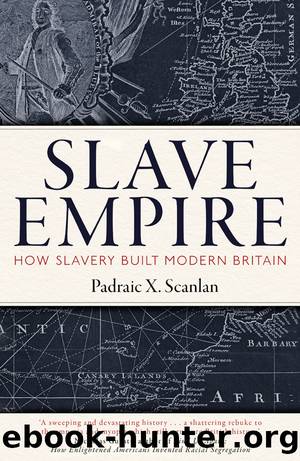Slave empire by Padraic X. Scanlan

Author:Padraic X. Scanlan
Language: eng
Format: epub
Publisher: Little, Brown Book Group
***
When news of the rebellion first reached Britain, leaders of the antislavery movement were weary and defensive. In one letter to Wilberforce, Zachary Macaulay complained that Canning wanted to blame the rebellion on âWilberforce, Buxton, and Co.â Macaulay was dismayed that the Orders-in-Council had gone out too quickly, and had imposed âdirect interference between master and slaveâ rather than a slow evolution of colonial policy.38
Wilberforce prepared to accuse Canning of causing the violence. News of Smithâs death, however, and the Demerara plantersâ extravagant efforts to pin the blame on him, changed the equation. Smithâs papers, and an account of his trial, published by the Anti-Slavery Society, became fodder for a counter-narrative of an innocent priest murdered by heathen slaveholders.
Slaveholders in other colonies helped the antislavery cause by responding to the rebellion in Demerara with their own persecutions of suspected conspiracies. In 1823 and 1824, Jamaican authorities claimed to have foiled a serious plot to overthrow the white government. According to reports that made their way to the House of Commons, a young enslaved butcherâs assistant, named William, answered a rebuke from his master with âAh! Massa, you will have bad Christmas.â The butcher demanded to know whether William knew something that he did not, whether the enslaved planned to âkill all the buckrasâ, and whether they were meeting at night to plan their assault. The boy â a teenager â might have felt a thrill of transgression when he told his master to get on board a ship as soon as he could, âas the negroes were going to rise, and walk all about and murder everybodyâ. William was arrested. Under interrogation, he implicated his father and six other men.
Jamaican planters were ferocious in punishing the trumped-up âconspiracyâ. All eight of the alleged conspirators were swiftly tried and executed. The only evidence was self-contradictory hearsay based on a teenagerâs boasts. The executions disgusted abolitionists, and even absentee slaveholders understood that their colonial counterparts had bolstered the case for imperial regulation of the slave colonies. Thomas Denman, MP for Nottingham, demanded a review. Justice, he argued, was impossible for an enslaved defendant in a court composed entirely of slaveholders. He cited another conspiracy case, where the accused was known to be mentally ill, and was punished for raving about âKing Wilberforceâ. He moved for censure, and the House of Commons passed a slightly amended version of the motion.39 The plantersâ paranoia was wearing thin in London, even among their supporters.
Download
This site does not store any files on its server. We only index and link to content provided by other sites. Please contact the content providers to delete copyright contents if any and email us, we'll remove relevant links or contents immediately.
| Africa | Americas |
| Arctic & Antarctica | Asia |
| Australia & Oceania | Europe |
| Middle East | Russia |
| United States | World |
| Ancient Civilizations | Military |
| Historical Study & Educational Resources |
Never by Ken Follett(2878)
The Man Who Died Twice by Richard Osman(2293)
Machine Learning at Scale with H2O by Gregory Keys | David Whiting(2281)
Fairy Tale by Stephen King(2062)
Will by Will Smith(2039)
Rationality by Steven Pinker(1763)
The Dawn of Everything: A New History of Humanity by David Graeber & David Wengrow(1569)
The Dark Hours by Michael Connelly(1565)
Principles for Dealing With the Changing World Order: Why Nations Succeed and Fail by Ray Dalio(1373)
Friends, Lovers, and the Big Terrible Thing by Matthew Perry(1326)
A Short History of War by Jeremy Black(1298)
HBR's 10 Must Reads 2022 by Harvard Business Review(1253)
Go Tell the Bees That I Am Gone by Diana Gabaldon(1233)
Can't Hurt Me: Master Your Mind and Defy the Odds - Clean Edition by David Goggins(1226)
515945210 by Unknown(1206)
Fear No Evil by James Patterson(1107)
443319537 by Unknown(1071)
Works by Richard Wright(1018)
Going There by Katie Couric(991)
